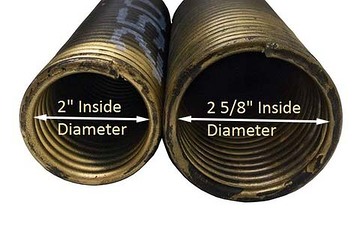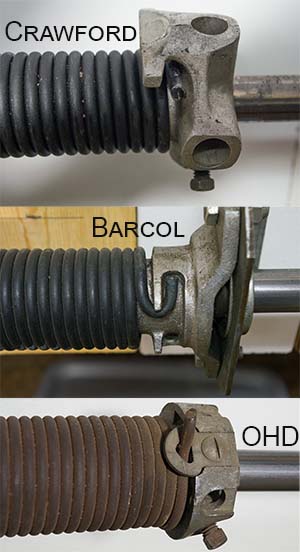Torsion Spring Inside Diameter Converter
If you currently have 1 3/4" ID springs, you can save 10% to 25% off by converting to 2" ID springs.

There are at least four situations where it is advisable to convert from one inside diameter to another.
One is when the springs are very old, and the hardware or cones are obsolete, as with some pictured below.
Another situation is where you may want to install longer life springs, but there is not enough room on the shaft. Increasing the inside diameter will allow you to install shorter springs with the same longer cycle life.
A third application would include times when springs with different inside diameters are available, and you need to check to see if what's available will work. For example, many doors have 1 3/4" ID springs, but some door companies carry only 2" ID springs on their trucks. This converter will provide the length of a 2" ID spring you will need to install if the broken spring you are replacing has a 1 3/4" inside diameter.
The fourth situation mentioned below is to save on the cost of the end cones. Mass-produced cones cost less than many of the OEM cones.
This program does not allow for converting wire sizes to change the strength of your springs or to increase your cycle life. Tools for doing this for 1 3/4," 2," and 2 1/4" ID springs are on our Standard Garage Door Torsion Springs page. For other commercial and industrial torsion springs, please contact us.
When converting the inside diameter, it is helpful to remember that a torsion spring consists of a given length of wire that is coiled around a rod. For example, increasing the diameter of the rod reduces the number of times the wire wraps around the rod, hence, shortening the length of the spring. In contrast to this, the spring will be longer if the inside diameter is reduced. Same amount of wire - same spring weight - same IPPT - same torque - same lift properties.
The "Current ID" pull-down menu displays all the inside diameters that have been used on sectional garage doors since manufacturing began. The end cones for many of these inside diameter springs are obsolete.
When converting to a different inside diameter, it is important to convert to a new inside diameter for which cones are made. The more common inside diameters include 1 3/4," 2," 2 5/8," 3 3/4," 5 1/4," and 6." OEM cones are also made for springs with the following inside diameters: 2 1/4" (Raynor), 3 3/8" (OHD), 5 1/2" (Raynor), 5 7/8" (OHD), and 7 5/8" (OHD). The cones for springs with these inside diameters are much more expensive, and we recommend converting to standard cones when possible. For example, a pair of the Raynor 3 1/2" cones cost $97.53; our 3 3/4" torsion spring cones sell for $21.03. When considering different inside diameters, remember to factor in the time needed to replace related torsion hardware.

If your old obsolete cones are in good shape, you can usually order new springs to fit them. It is important to order the correct springs. One reason is that they are not returnable. The other reason is that the older springs had unique inside diameters and special ends. For example, many of the old Crawford doors have 1 19/32" I.D. springs, and the ends are extended to lock into the cones. Many of the BarCol springs had 1 13/16" ID springs, and they are often hooked on the ends. Overhead Door has springs with ends that are bent up to fit into special clips.
